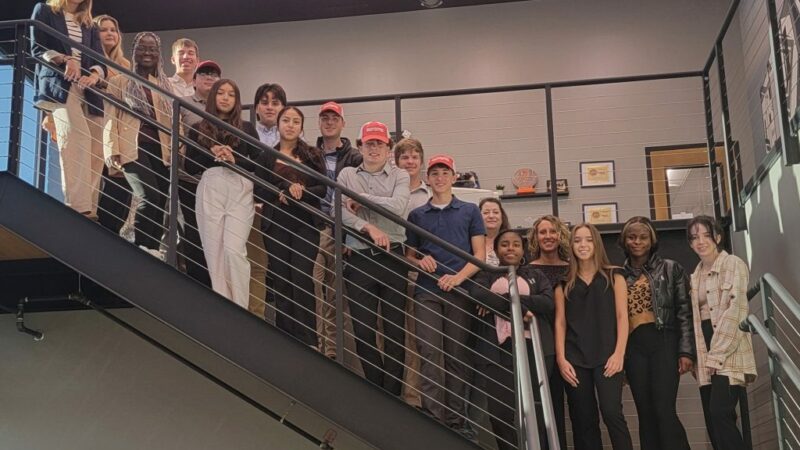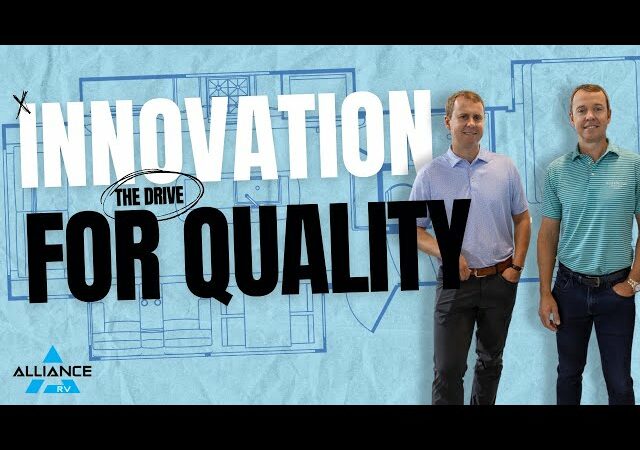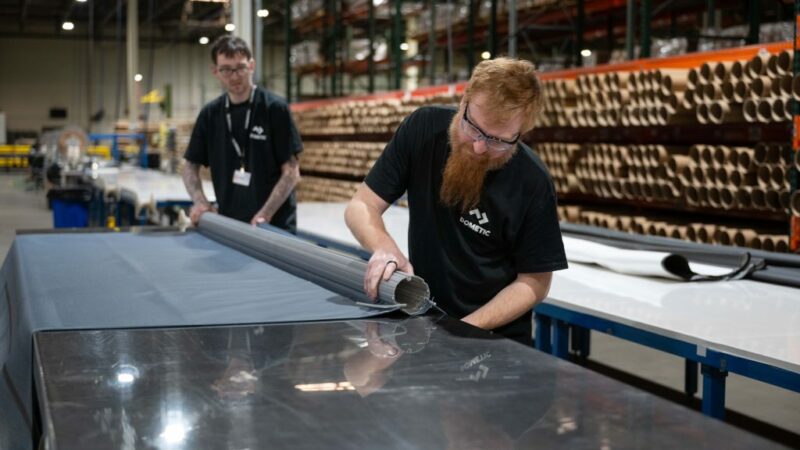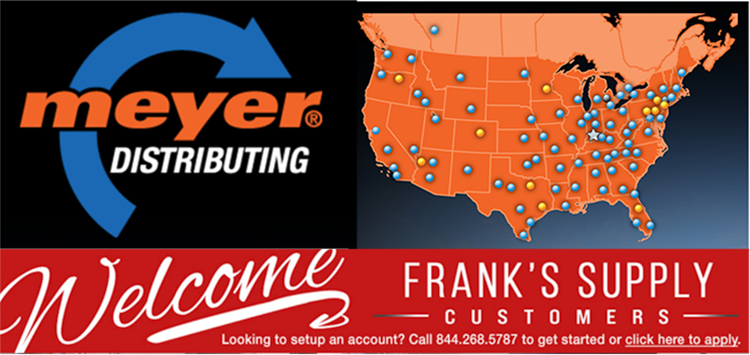CEOs: Don’t Settle for Status Quo; Don’t Hire People Who Do – RVBusiness – Breaking RV Industry News
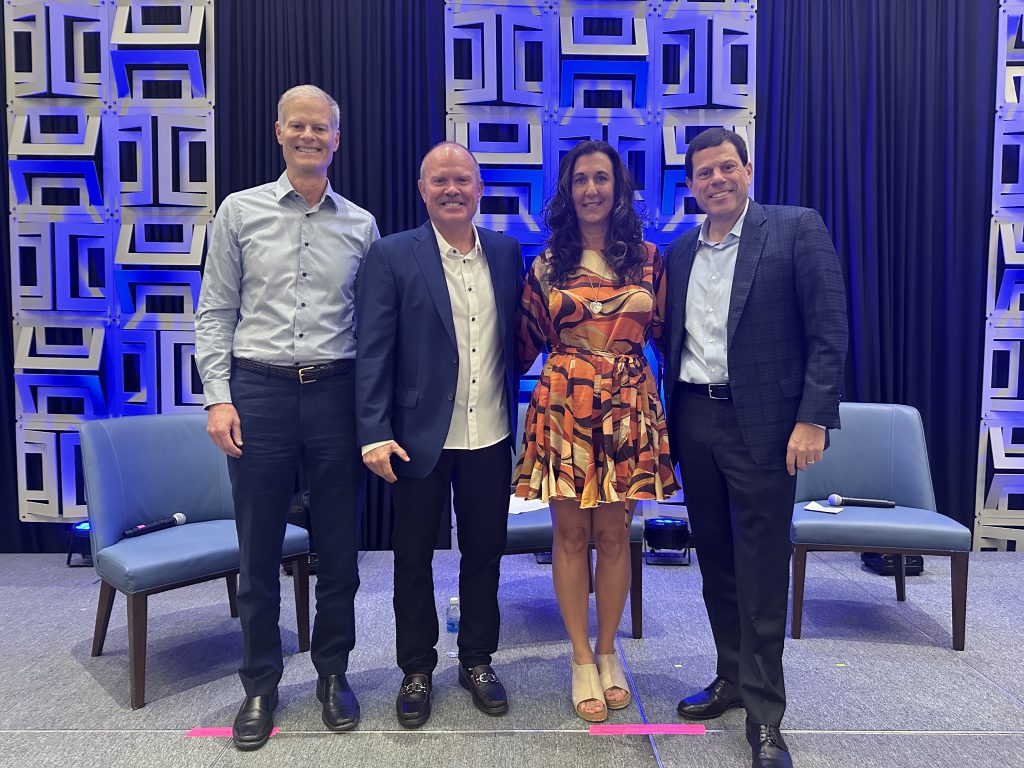
One of the highlights of last week’s RV Industry Leadership Conference, which was hosted March 5-7 by the RV Industry Association (RVIA) at the Hyatt Regency Coconut Point Resort and Spa in Bonita, Springs, Fla., was a CEO Panel Discussion about leadership styles.
Featuring Grand Design RV President & CEO Don Clark, Blue Compass RV President & CEO Jon Ferrando, and Thetford/Norcold Executive Vice President Mary Pouliot, the panel discussion was a fascinating conversation in which the three executives shared their thoughts on leadership.
The common thread among all three was good leaders surround themselves with good people, and be willing to adapt their leadership style according to changing circumstances.
“It changes over time, but I think my leadership style right now is really around a transformational leadership style, setting that vision and setting high expectations and empowering my people to execute towards that,” said Pouliot. “When I first started off in leadership, I was more directional, more transactional and over time it’s evolved. But as you evolve towards collaboration and teamwork, you evolve your leadership style. That’s what I learned. You need a team; you can’t do it all yourself.”
Clark suggested that good leaders shouldn’t settle for the status quo and shouldn’t surround yourself with people who do.
“It’s okay to be unconventional. It’s okay to be bold. It’s okay to take a chance or take a risk to various heights or levels,” said Clark. “And don’t be afraid to fail, because sometimes those failures, you learn more from things that don’t go the right way or the way you anticipate it and you’re better for it.”
Ferrando
What follows is an edited sampling from the hour-long panel discussion.
Craig Kirby: Jon, what was your biggest surprise in coming from AutoNation into the RV side?
Jon Ferrando: The only surprise was I knew and was told, hey, service and parts is way less developed than automotive. And then when I got in, I found out it was even more less developed in automotive.
So, even today at our stores – and I’m sure across America – you can call an RV dealer, hey, when can I get in for service? Well, it’s two weeks, four weeks, six weeks. In automotive, you’re getting that customer back out the same day. They need your vehicle to get to work, get the kids to school.
So that was a surprise, but actually a pleasant surprise because it really meant there was even more opportunity to grow service and parts within our business. And we actually grew it last year, even as the rest of the business was down a lot.
So that was maybe one of the surprises. Then the second one would be a pleasant surprise of how fun this industry is and the opportunity to work with people like Mary and Don Clark is really amazing. It’s a fun industry and that part of it has been really rewarding.
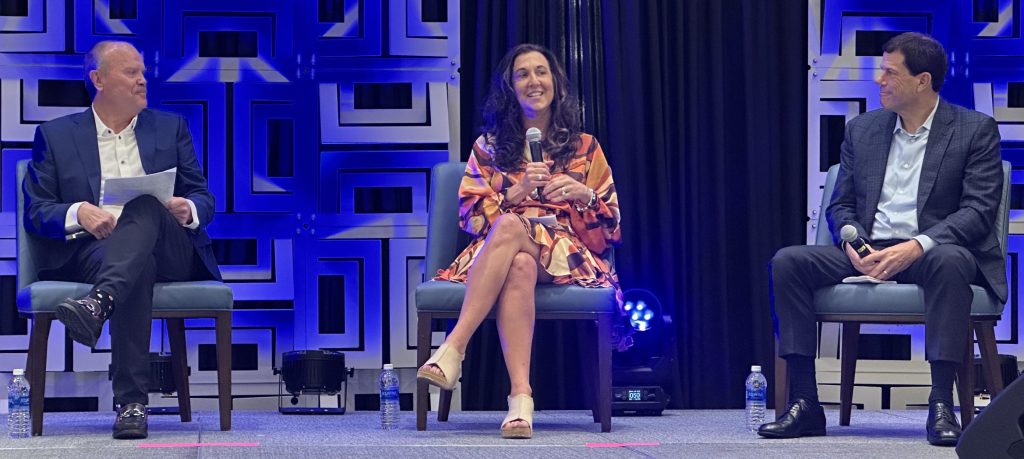
Kirby: Mary, can you talk about the challenges that you faced as you’ve grown as a leader and how you overcame those challenges?
Mary Pouliot: For me, it’s really about finding my grounding and I equate it to what we learned yesterday when they talked about how service is black and white and hospitality was color. That’s the way I think of leadership. Leadership is color.
In the beginning I thought I could just walk into a room, tell somebody what to do, walk away, and go back to my office and find the comfort of numbers because I’m a data geek. But then I walked back out – and if you remember what they showed yesterday, that food fight, that’s what I saw when I walked back out after telling people what to do. It was just chaos.
And I thought, ‘Wow, I’ve got to find my grounding, what works for me, what works for them;’ because it’s always different. Whether you’re leading a person, one-on-one, whether you’re doing a group, whether you’re doing a company, everything is different and I’m always learning.
That’s what I realized is that you are not going to be able to say, ‘I’m going to pick this leader out and I’m going to be just like them.’ What you can take is a little bit from each of the leaders that you’ve met, and – heck, I can learn from these two right here and yourself – and put that in a toolbox. But it is really about trial and error.
Kirby: Don, how did you determine the culture you wanted for Grand design?
Don Clark: Well, it was a process. We wanted to be different. We wanted to be meaningful to the industry and we had been in the industry for quite some time. And we wanted to create something special for our ultimate customer, the people that actually own our vehicles.
But we also wanted to create a culture that we could be special for our dealers, we could be special for our suppliers, and most of all, or last but not least, a special type of company for our team members. And rarely do we use the word employees, never wanted to create them and us type of environment.
So, everyone in our company gets a say in the direction of the company. It doesn’t mean we’ll go in a hundred or a thousand different directions, but we like to invite people to have real meaningful input in the company. We still do that today.
Kirby: Jon, how do you create a company that, a culture that fosters innovation, creativity, especially when you have so many dealerships across the country?
Ferrando: I would say it’s been a tremendous focus of mine and the senior leadership team to define our core values around investing in people, focusing on providing an exceptional customer experience – whether it’s in sales, to the delivery, to service and parts, and staying connected through the very last RV adventure.
We built out a sense of purpose with our associates that brings us together around both providing great careers for our people with a lot of investments in training and career development and opportunities.
And then, secondly, really the purpose of coming together to provide that amazing experience for customers that, as all of you know, they saved their whole lives, they have a dream of buying their fifth-wheel and seeing America. It’s a huge purchase, maybe second-largest purchase they’ve ever made. And for us, coming together to be able to create that opportunity for our customers so they can create those lasting memories, that’s what brings us together.
So, we built out our core values, and we spend a lot of time communicating our core values. And the challenge is when you grow that fast and you have a hundred different locations, how can you stay connected all the way down to the shop floor? We are really intentional and relentless around communications. Last year we rolled out our new brand. I went to every single store, a hundred stores. We made the new brand about our associates. We celebrated our associates, from service to sales to the detailers, around their passion that they bring to our customers that bring us all together.
Kirby: Mary, is your CEO role different than what you anticipated?
Pouliot: Absolutely, it is. I guess I never realized when I went from basically managing a business unit to managing an entire company. When you manage a business unit, I felt like I had my arms around the whole unit and we were all marching in the same direction. But once you add in the entire company and everybody’s different opinions and thoughts, and I was marching down the hall and I looked back and I was by myself because I’m like, ‘Oh, they’re going that direction and that direction.’
That was much, much different than I anticipated, and I changed my leadership style because of it.
Kirby: Don, how do you approach hiring and building the team, and what qualities do you look for in potential hires and how do you ensure they align with the company’s values?
Clark: I think it was Patrick Lencioni, who said, ‘Humble, hungry, and smart.’ I think that still holds true today, really more than ever. And we look for those qualities. In fact, all of our management staff looks for those qualities as we add staff.
There’s another thing that’s just as important – especially in a competitive industry that we are in – we also look for the drive to win. Someone who just doesn’t want to stay static. They want to grow in their own career, but they want to help grow the company as well. So, we look for that, our managers look for that.
Team players are very, very important. Again, we don’t want to create silos within our company. We have maybe swim lanes, but we don’t invite people to stay in those lanes. If our head of ops wants to get involved and ask questions on service, they will, and service won’t get upset for that. We believe many minds are better than one.


